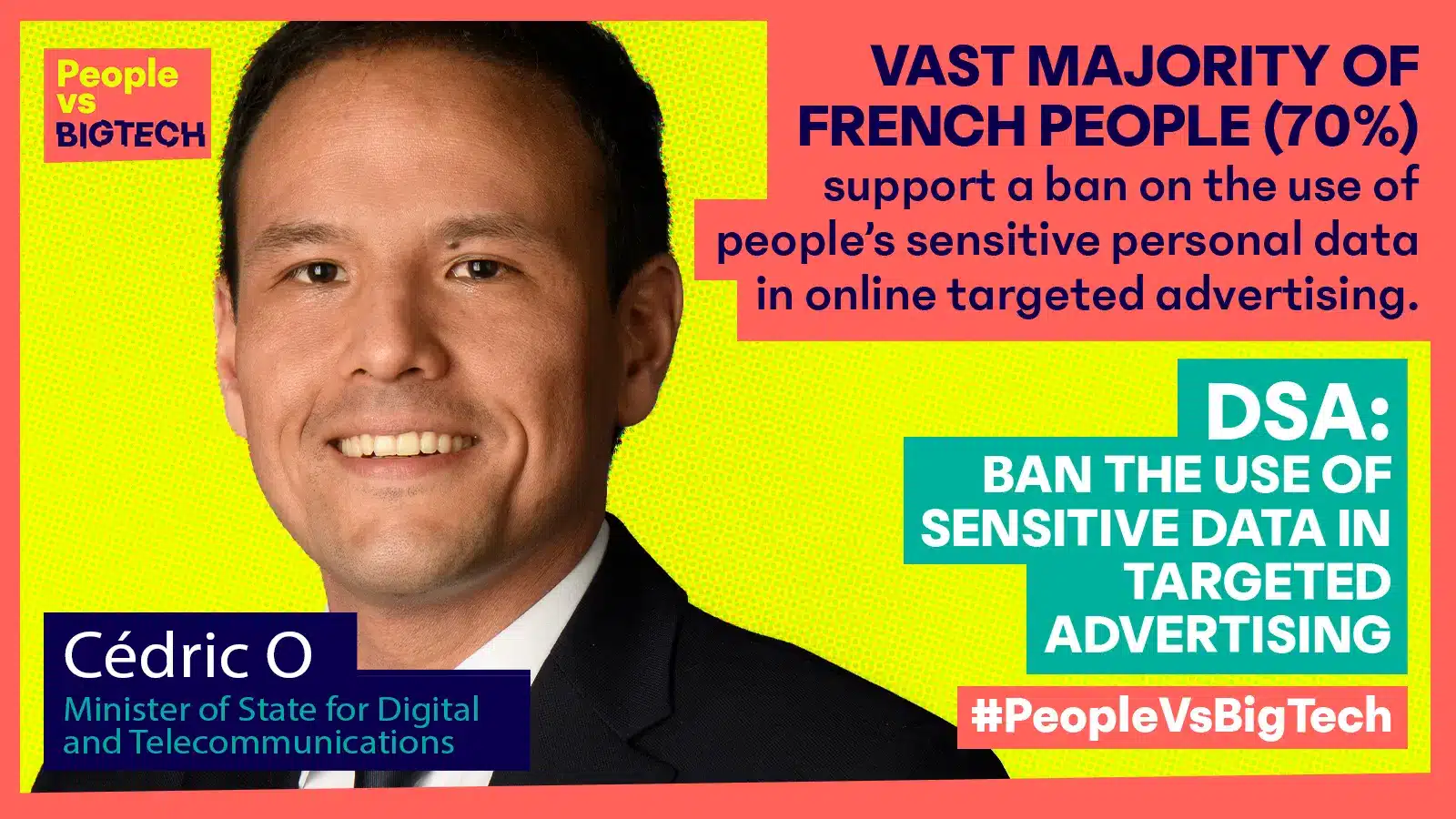Vast Majority of French People Do Not Want to be Targeted with Online Ads Based on Their Sensitive Personal Data (YouGov Poll)
New polling reveals 70% of adults in France support a ban on the use of people’s sensitive personal data in online targeted advertising

New polling reveals 70% of adults in France support a ban on the use of people’s sensitive personal data in online targeted advertising.
A new YouGov poll commissioned by the People vs Big Tech network demonstrates that people in France find it wholly unacceptable for technology companies to target individuals with online advertising based on their personal data. The findings come just as French Minister of State for Digital and Telecommunications, Cédric O, announced that the Digital Services Act (DSA) will include a ban on targeted ads using sensitive data, as well as targeted ads to minors. While this is a promising development, it’s not a done deal as EU lawmakers continue to discuss the final provisions of the landmark legislation which aims to hold large online platforms accountable for the harms of their business model.
At a time when industry pressure appears to be causing representatives of the EU Commission and EU Council to consider backsliding and removing the proposed measure by the European Parliament, the survey shows that 69% of people in France find it unacceptable for technology companies to use their personal data in such a way.
Rewan Al-Haddad, Campaign Director at SumOfUs, said: “For years now people across Europe have been demanding stronger protection against Big Tech’s toxic and abusive data practices which only serve to enrich the coffers of the likes of Mark Zuckerberg – and these poll results in France demonstrate exactly that. Now the question is whether EU lawmakers will follow Cédric O’s lead, or capitulate to Big Tech lobbyists.”
A full 70% of those polled supported a ban on the use of people’s sensitive personal data (such as a person’s ethnicity, religious beliefs, sexual preferences, health conditions, or political opinions) in online targeted advertising – with 42% strongly supporting such a ban. By contrast, just 10% strongly opposed a proposed ban on the invasive practice.
These findings are particularly significant for French politicians as France currently chairs the negotiations for the DSA and plays a pivotal role in shaping the rules by which Big Tech companies will be allowed to operate in Europe going forward. Of note, the overall results of the survey show public opinion in France is in line with the views of small business leaders as well. For more information on their views, see January 2022 polling.
The EU has a decisive opportunity to establish the baseline protections necessary to secure the fundamental rights of EU citizens. Because no regulation currently prevents companies like Meta/Facebook or Google from profiling people based on their sensitive data (or making inferences about such characteristics), the online targeted advertising system has been repeatedly weaponised with ads designed to suppress votes, sell miracle cures, recruit militia, and incite violence.
But an opportunity to stem these harms is available and, as the YouGov poll results demonstrate, the time to act is now. The measure proposed by the European Parliament to prohibit the use of sensitive data in Article 24 of the DSA (including the drawing of inferences about a person’s sensitive characteristics) for the purpose of displaying advertisements must be adopted into the final provisions of the law. A system that enables foreign interference, facilitates the spread of disinformation, and inflames tensions between groups can no longer be permitted to operate without robust government oversight and new rules in place to protect privacy, promote safety, and maintain the integrity of Europe’s democratic processes.
Polling Note: All figures, unless otherwise stated, are from YouGov Plc. Total sample size was 1023 adults. Fieldwork was undertaken between 21st - 23rd March 2022. The survey was carried out online. The figures have been weighted and are representative of all French adults (aged 18+).



